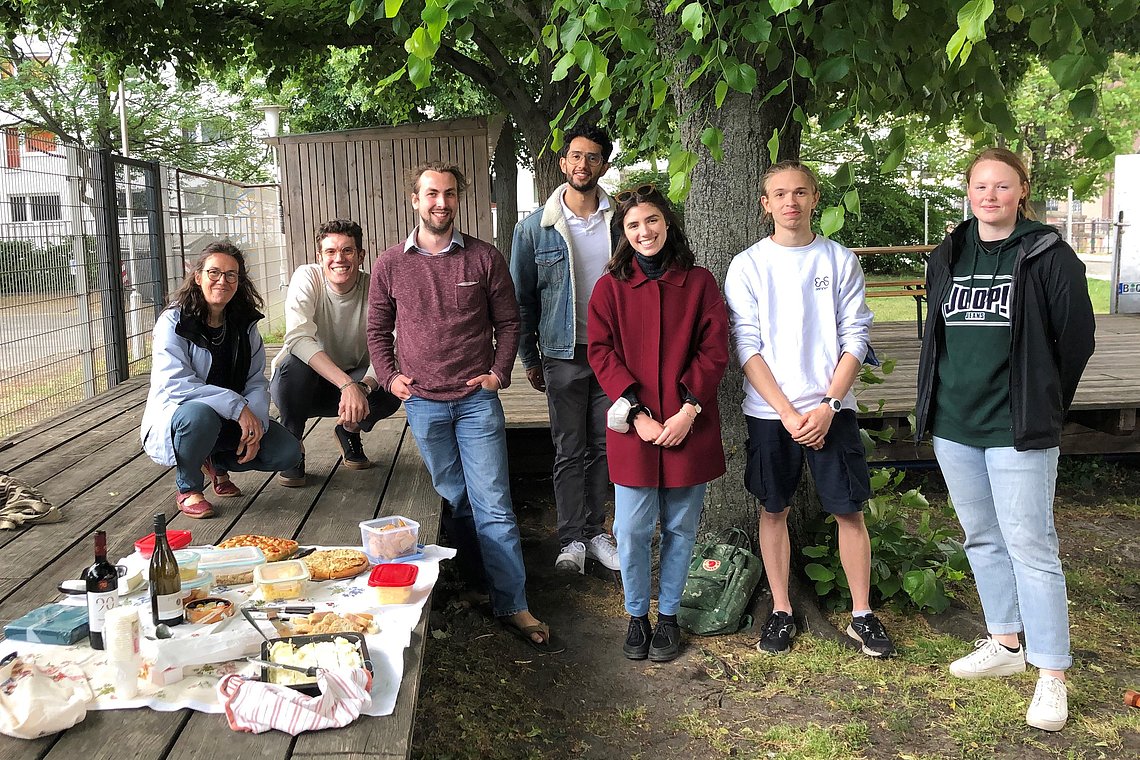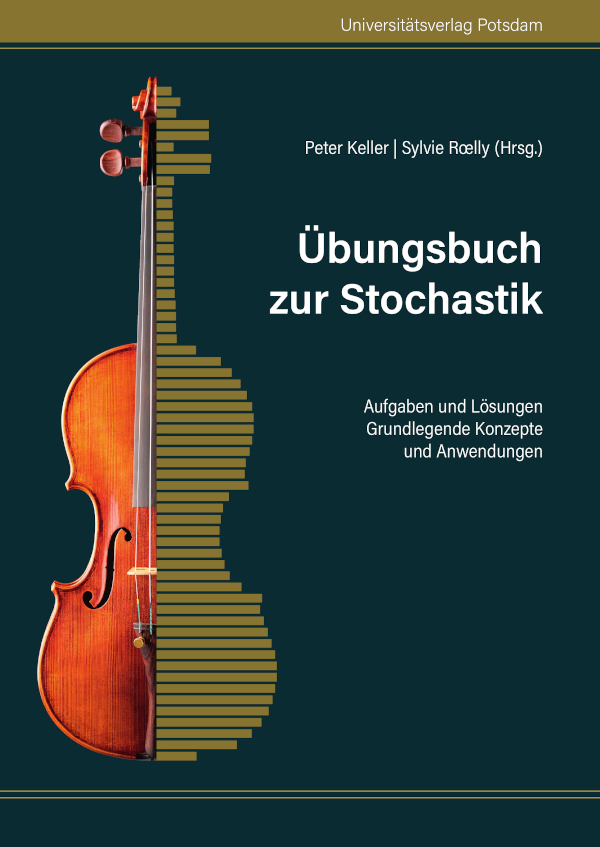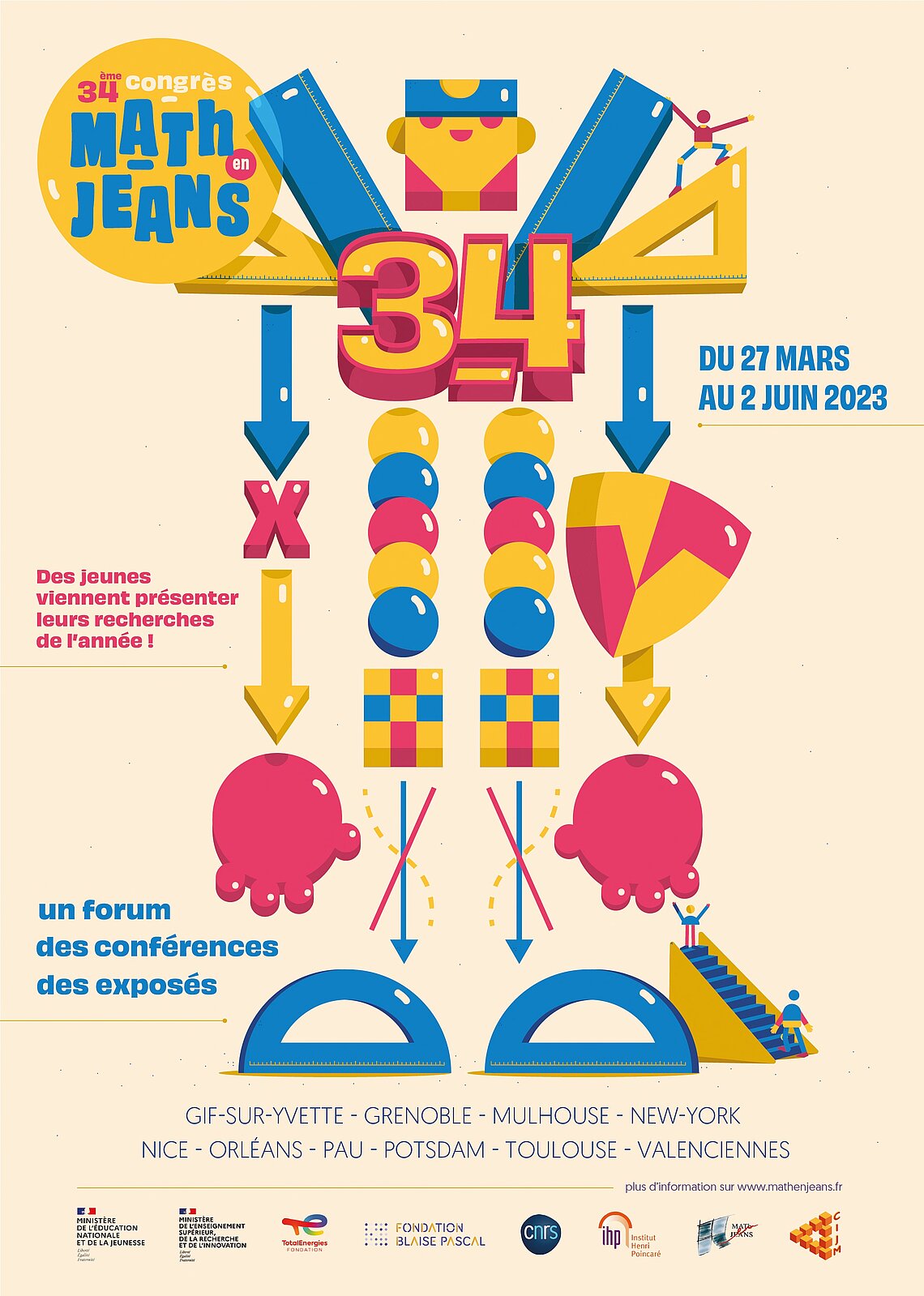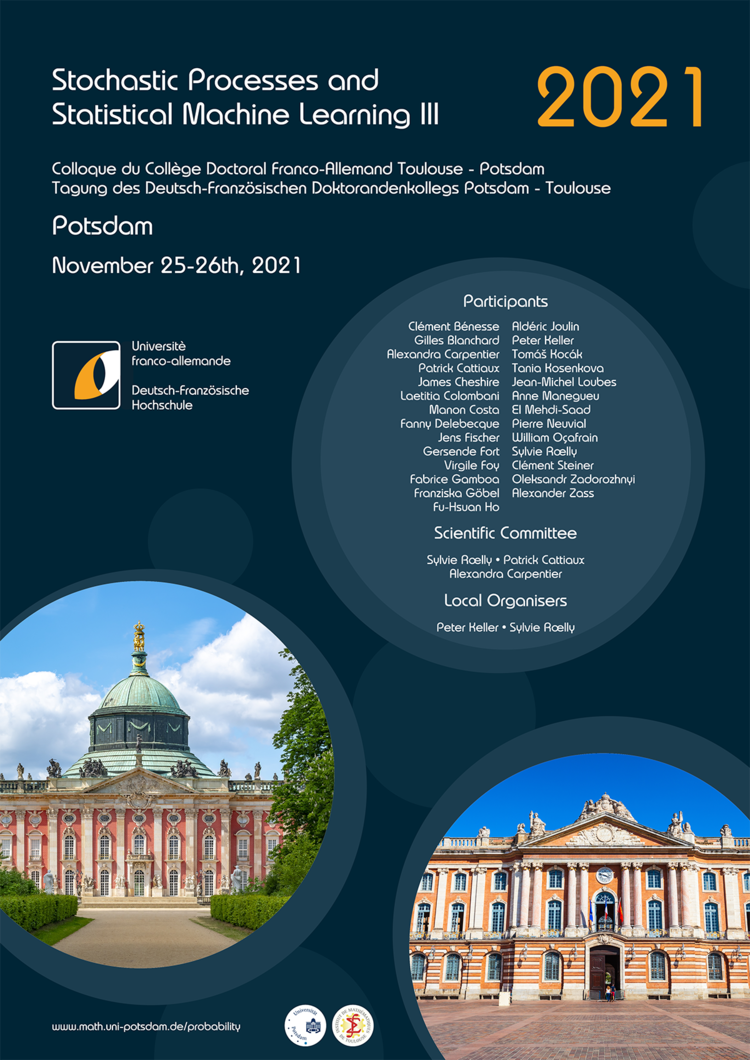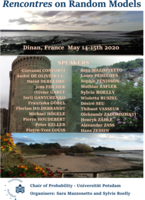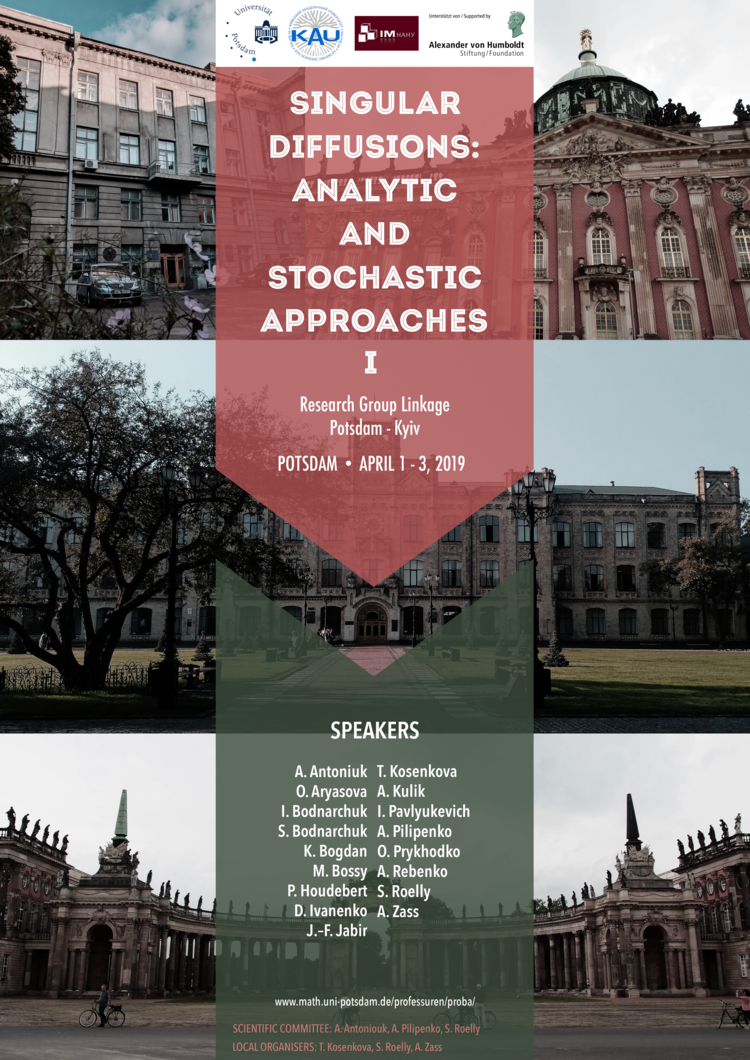Andrey Pilipenko (Nat. Acad. of Sciences & Nat. TU of Ukraine, Kyiv)
The Skorokhod reflection was used in 1961 to create a reflected Brownian motion on the half-line. Later, it was used for processes with jumps such as reflected Lévy processes. Like a Brownian motion,...
mehr erfahren
Michael Högele (Univ. de los Andes, Kolumbien)
In this talk we present a quantitative version of the Borel-Cantelli lemma, which allows for a quantification of the "tradeoff" between a.s. rates of convergence and the precise integrability of the...
mehr erfahren
Giovanni Conforti (Ecole Polytechnique, Paris)
It has been known for a long time that Hamilton-Jacobi-Bellman (HJB) equations preserve convexity, namely if the terminal condition is convex, the solution stays convex at all times. Equivalently,...
mehr erfahren
Sabine Jansen (LMU München)
Studying the time-evolution of a many-particle system is a difficult task. For some interacting particle systems in Z^d, duality and intertwining allow to map the time evolution of one- or two-point...
mehr erfahren
Anthony Réveillac (INSA Toulouse)
Hawkes processes have proved to be a powerful probabilistic model for various applications in neurosciences or insurance. These counting processes are defined through their intensity which is...
mehr erfahren
Patrik Ferrari (Univ. Bonn)
We will discuss results on the correlation structure of some models in the KPZ universality class, for instance, on the covariance of limiting the processes along characteristic lines and of the...
mehr erfahren
Giovanni Conforti (Ecole Polytechnique, Palaiseau)
The aim of this talk is to provide with an introduction to score-based diffusion models, that are a special class of generative models that has recently provided with impressive experimental re�sults...
mehr erfahren
Pierre-Yves Louis (Univ. Bourgogne Franche-Comté)
We will present an overview of some new models and results about the long time behaviour of stochastic processes with reinforcement. Some applications will be outlined : urn models with different kind...
mehr erfahren
Wioletta Ruszel (Univ. Utrecht)
The sandpile model (aka chip-firing game) is a toy model for studying self-organized criticality (SOC). SOC models are characterized by displaying power-law probability behaviour of certain quantities...
mehr erfahren
David Dereudre (Univ. Lille)
For an inverse temperature β>0, we define the β-circular Riesz gas on Rd as any microscopic thermodynamic limit of Gibbs particle systems on the torus interacting via the Riesz potential...
mehr erfahren
Ben Povar (Univ. of Warwick)
We study the joint convergence of Bienaymé-Galton-Watson processes with immigration (BGWI) and its ``naive'' local times at 0 to the corresponding Continuous Branching Process with immigration (CBI)...
mehr erfahren
Dr. Sophie Pénisson (Univ. Paris-Est Créteil)
We present a mathematical model of tumor evolution that includes all phases in the life of a tissue, from tissue development to cancer occurrence. The effects of a carrying capacity, different types...
mehr erfahren
Dr. Jens Fischer (D-fine AG, Zürich; Univ. Toulouse)
With the advancements in quantum computing in recent years, the need for secure encoding methods, which can withstand quantum attacks, has motivated a new research branch in cryptography known as...
mehr erfahren
Laetitia Colombani (Univ. Bern)
In this seminar, I will introduce a biological model we are constructing, and explain the questions that drives us. In link with this model, I will present the notion of experimental design, and how...
mehr erfahren
Sara Mazzonetto (Univ. de Lorraine, Nancy)
In this seminar we first describe a class of real Markov processes with continuous sample paths which
shows singular behavior at a point, let us say barrier. The barrier is semi-permeable or sticky....
mehr erfahren
Olga Aryasova (Inst. of Geophysics, Nat. Acad. of Sciences of Ukraine / Friedrich–Schiller–Univ. Jena)
We study the homogenization problem for a multivariate stochastic differential equations with local times that determine semipermeable reflecting hyperplane interfaces. We show that this system has a...
mehr erfahren
Dr. Angelo Valleriani (Max-Planck-Inst. of Colloids and Interfaces, Dept of Biomaterials, Potsdam)
The malaria parasite Plasmodium falciparum is ingested by the mosquito of the species Anophele, when
the mosquito gets a blood meal from an infected host. Inside the mosquito, the parasite's first 24...
mehr erfahren
Oleksandra Antoniouk (Institute of Mathematics NAS of Ukraine, Kyiv Academic University)
The talk gives a brief overview of the results related to the theory of pseudo-differential equations in the spaces of test and generalized functions on the field of p-adic numbers. Results related to...
mehr erfahren
Andrey Pilipenko (Inst. of Mathematics, Nat. Acad. of Sciences & Nat. TU of Ukraine, Kyiv)
Let X be a diffusion in a cone with oblique reflection at the boundary. We study the question whether X reaches a vertex of the cone in a finite time with positive probability. A new probabilistic...
mehr erfahren
Antonio Ocello (Sorbonne-univ., Paris)
We study the existence of optimal control for branching diffusion processes. The considered problem use rewards that can be nonlinear in the final payoff and linear in the running payout. We give a...
mehr erfahren
Peter Nejjar (Bonn Uni./Potsdam Uni.)
The standard CLT is characterized by a fluctuation exponent of one half and a gaussian limit distribution. We will discuss several examples, e.g. of random growth models and interacting paticle...
mehr erfahren
Suren Poghosyan (Nat. Acad. of Science, Armenia)
For a pair potential Φ in a general underlying space X satisfying some natural and sufficiently general
conditions we define by means of the so called Ursell kernel a function r which is shown to be...
mehr erfahren
Martha Nansubuga (HU Berlin)
We study stochastic differential equations (SDEs) driven by semimartingales with jumps, where the jumps of the solution are obtained as small relaxation time limits of fast curvilinear motions along...
mehr erfahren
Willem van Zuijlen (WIAS, Berlin)
We investigate a model of simple-random walk paths in a random environment that has two competing features: an attractive one towards the highest values of a random potential, and a self-repellent one...
mehr erfahren
Laetitia Colombani (U Toulouse)
Hawkes processes were introduced by Hawkes in 1971, and are widely used in many applications (earthquakes, neurons, social network, finance, etc.) They are random point processes on the real line, and...
mehr erfahren
Andrey Pilipenko (Acad. of Science, Kyiv)
We consider the random motion of a particle, whose jumps outside of a bounded set (membrane) are mean-zero i.i.d. with a finite second moment. Jumps from the membrane have other finite mean...
mehr erfahren
Gioele Gallo (Köln)
The study of Gaussian free field level sets on supercritical Galton-Watson trees has been initiated by Abächerli and Sznitman. We continue this investigation by means of different tools in order to...
mehr erfahren
Jens Fischer (Toulouse, UP)
Social network models are a common tool to further the understanding of relation based interactions in societies. Nonetheless, a complete mathematical understanding is lacking due to the complexity of...
mehr erfahren
Marta Dai Pra (HU Berlin)
This talk focuses on the study of population models with a seed bank, in particular presenting their construction from classical models, some duality results and tree properties.The first part is an...
mehr erfahren
Alexander Zass (WIAS Berlin)
In this talk we present the open problem of Bose--Einstein condensation. In the first part, we provide a
historical background and some physical heuristics for this state of matter that was first...
mehr erfahren
Anne Flöge (UP & WIAS Berlin)
We investigate the order of the phase transition in the free Bose gas and start with a criterion of a phase transition of order 2 for general q_k. Then we continue the analysis under a gamma...
mehr erfahren
Julian Kern (ENS Lyon, Potsdam)
The Symmetric Simple Exclusion Process (SSEP) is a very important toy model in particle systems. I will use it and related processes to showcase some ideas from the theory of hydrodynamic limits which...
mehr erfahren
Ilya Pavlyukevich (Jena)
In case of SDEs driven by continuous semimartingales, it is well know that their Wong-Zakai approximations converge to Stratonovich SDEs, whereas in the jump case the so-called Marcus (canonical) SDEs...
mehr erfahren
Wioletta Ruszel (Utrecht)
Interfaces separating two phases (e.g. water and ice) are created in phase coexistence situations such as at 0 degree Celsius. Random interface models are stochastic models which aim at explain�ing...
mehr erfahren
Emilio Corso (ETH Zürich)
A leitmotif in probability theory is the discovery of universal, deterministic phenomena underlying the asymptotic behaviour, in a suitably defined sense, of random structures. In the ergodic theory...
mehr erfahren
Batu Güneysu (UP)
Abstract:
It is a classical fact that one can represent the heat semigroup of a Schrödinger operator (that is, a perturbation of the Laplacian by a real-valued potential) as a path integral in terms...
mehr erfahren
Alexander Zass (UP)
In this talk we present some results on the existence and uniqueness of marked Gibbs point processes. Firstly, we prove in a general setting the existence of an infinite-volume marked Gibbs point...
mehr erfahren
Luisa Andreis (Uni. Firenze)
Inhomogeneous random graphs are a natural generalization of the well-known Erdös Rényi random graph, where vertices are characterized by a type and edges are independent but distributed...
mehr erfahren
David Dereudre (Lille, Frankreich)
We consider the bond percolation model on the lattice Zd (d≥2) with the constraint to be fully connected. Each edge is open with probability p∈(0,1), closed with probability 1−p and then the process...
mehr erfahren
Dr. Sara Mazzonetto
With the term threshold diffusion we denote diffusion processes which follow different dynamics in different space intervals. We focus on the one-dimensional case of two Ornstein-Uhlenbeck dynamics in...
mehr erfahren
Anne Manegueu (Magdeburg)
Recent decades have seen rapid advances in multi-armed bandits (MAB) algorithms, due to their ability to optimize with the presence of uncertainty. Classical MAB problems are studied based on the...
mehr erfahren
Angelina Henning (UP)
In diesem Vortrag wird das Testverfahren von Wilcoxon betrachtet, welches eine Alternative zum 2-SP-t-Test liefern kann. Dieses Verfahren gehört zu den sogenannten Rangtests. Neben der theoretischen...
mehr erfahren
Oleksandr Zadorozhnyi (Uni Potsdam)
In this talk I firstly discuss a general martingale-difference approach which can be used to obtain some of the existing concentration inequalities for 1-dimensional weakly-dependent random processes....
mehr erfahren
Han Cheng Lie (University of Potsdam)
The estimation of statistics of functionals of a diffusion process is a problem that arises in multiple applications. An example of such a problem involves estimating the expected value of the first...
mehr erfahren
Peter Keller
Imagine, a robot is moving through a maze that consists of equal sized rooms. Adjacent rooms are connected by doors. The robot can now perform actions, choosing the next door with respect to a given...
mehr erfahren
Alexander Zass (Potsdam)
We present a uniqueness result for Gibbs point processes with repulsive pair interaction; in particular, we provide an explicit uniqueness region in terms of the activity and inverse temperature...
mehr erfahren
Joseph Lam (Magdeburg)
The consequences of local differential privacy constraints on goodness-of-fit testing are considered, i.e. the statistical problem assessing whether sample points are generated from a fixed density or...
mehr erfahren
Jens Fischer (Potsdam/Toulouse)
The voter model and the Deffuant model are two well known models on networks where individual opinions influence the relationsship dynamics. Recent work related to social networks focuses entirely on...
mehr erfahren
Andrea Hübner
Master thesis
mehr erfahren
Pierre Gaillard (INRIA Paris)
In this presentation we will examine the framework for online prediction of arbitrary time series. In the latter, a learner sequentially makes predictions of a time series, for which no stochastic...
mehr erfahren
Saeda Marello (Bonn)
The Curie-Weiss model (CW) is a classical model of a ferromagnetic spin system in which all spins interact with each other. After giving an introduction on metastability, a phenomenon appearing in a...
mehr erfahren
Anne Flöge (Potsdam)
TBA
mehr erfahren
Andrey Pilipenko (Kyiv)
Abstract. Let \((\xi_1,\eta_1), (\xi_2,\eta_2),\ldots\) be asequence of i.i.d. two-dimensional random vectors. We prove a functional limit theorem for the maximum of a perturbed random walk \(\underse...
mehr erfahren
Oleksandr Zadorozhnyi (Potsdam)
In the talk I present the stochastic multi-armed bandit problem and its analysis in the case when the arm samples are dependent over time and generated from the so-called weak \(\mathcal{C}\)-mixing...
mehr erfahren
András Tóbiás (TU Berlin)
We investigate a probabilistic model for routeing of messages in relay-augmented multihop ad-hoc networks, where each transmitter sends one message to the origin. Given the (random) transmitter...
mehr erfahren
Michael Högele (Universidad de los Andes, Bogotà, Colombia)
In this talk we present a linear scalar delay differential equation subject to small multiplicative power tail Lévy noise. We solve the first passage (the Kramers) problem with probabilistic methods...
mehr erfahren
Sandra Kliem (Frankfurt)
The one-dimensional KPP-equation driven by space-time white noise,
\[ \partial_t u = \partial_{xx} u + \theta u - u^2 + u^{\frac{1}{2}} dW, \qquad t>0, x \in \mathbb{R}, \theta>0, \qquad \qquad u(0,x)...
mehr erfahren
Han Cheng Lie (Universität Potsdam)
Global long-term properties of dynamical systems, such as their stationary distribution or rate of mixing, are strongly related to spectral objects of certain operators. These operators, which are...
mehr erfahren
Olga Aryasova (Kyiv)
We consider an Euclidean space with semipermeable membranes on nonsmooth surfaces, for example, on the boundary of a wedge or a cone. We study the existence and uniqueness of a strong Markov process...
mehr erfahren
Sara Mazzonetto
In this talk we introduce a nonlinear integration-by-parts formula for stochastic differential equations. We call it Itô-Alekseev-Gröbner formula because it generalizes both Itô formula and the...
mehr erfahren
Franziska Göbel (Universität Potsdam)
In this talk I will present a multiscale approach to construct a data-adapted basis-like (Parseval frame) set of functions F which allows for a decomposition of every square-integrable function...
mehr erfahren
Enrico Reiß (Universität Potsdam)
In mean field theories of statistical mechanics where N particles interact, macroscopic observables typically take values in a scaled lattice with lattice spacing 1/N. An easy but typical example is...
mehr erfahren
Pierre Houdebert (Universität Potsdam)
The Fortuin-Kasteleyen representation, introduce in the 1960', is a method used to prove phase transition for Gibbs point process. It reduces the problem of phase transition to the study of...
mehr erfahren
Wolfgang Löhr (Universität Duisburg-Essen)
Markov chains on sets of (finite, graph-theoretic) trees arise in applications, e.g., as evolving genealogical trees in population models or in Markov chain Monte Carlo methods for the reconstruction...
mehr erfahren
Oleksandr Zadorozhnyi (Potsdam)
In the talk I present a Bernstein type inequality for Banach-valued random sums under weak-dependency assumption of general kind on the variables and smoothness assumption on the underlying Banach...
mehr erfahren
Paolo Pigato (WIAS Berlin)
I will review some empirical facts on implied volatility and how they recently led to the introduction of rough (fractional) stochastic volatility models in finance. I will recall some results in...
mehr erfahren
Giovanni Conforti (Ecole Polytechnique)
In deterministic control, the turnpike property is the fact that optimal solutions consist approximatively of three pieces. The first and third pieces are rapid transitions from the initial state to a...
mehr erfahren
Oleksandr Prykhodko (Kyiv)
We will construct a random walk with specific lagging in point 0 and prove that for appropriate scaling the limiting process is so-called sticky Brownian motion.
mehr erfahren
Hannah Marienwald (TU Berlin)
Dynamic diversification – finding a set of data points with maximum pairwise distance from a time-dependent sample pool – is an important, but NP-hard problem in many different applications....
mehr erfahren
Suren Poghosyan (Yerevan, Armenia)
The traditional method for the construction of the limiting Gibbs measure uses the thermodynamic limit of the finite volume correlation functions. These limiting correlation functions are defined...
mehr erfahren
François Bachoc
We consider a Gaussian process subjected to inequality constraints (for instance boundedness, monotonicity or convexity). These types of inequality constraints correspond to additional information on...
mehr erfahren
Tania Kosenkova
In the talk, we present a characterization of the bridges of Lévy processes through a functional equation. This result allows us to obtain stochastic domination for the bridges through unconditioned...
mehr erfahren
Olga Aryasova & Andrey Pilipenko
10:15-11:00 : A. Pilipenko, On pertubertation of an ODE with non-Lipschitz coefficients by a small noise
We study the limit behavior of an ordinary differential equation with non-Lipschitz...
mehr erfahren
Dr. Pierre Houdebert
The Widom-Rowlinson model is formally defined as two homogeneous Poisson point processes forbidding the points of different type to be too close. For this Gibbs model the question of uniqueness/...
mehr erfahren
Florian Hildebrandt (Hamburg)
Stochastic partial differential equations (SPDEs) are becoming increasingly popular for modeling phenomena from the natural sciences and finance and thus require statistical methods for their...
mehr erfahren
Dr. Ester Mariucci
It is common practice to treat small jumps of a Lévy process as Wiener noise and thus to approximate their marginals by means of their corresponding Gaussian distributions.
However, results that allow...
mehr erfahren
Dr. André de Oliveira Gomes
Homogenization theory studies, roughly speaking, the effects of high frequency oscillations on the coefficients of the solutions of partial differential equations (PDEs for short). In the simplest...
mehr erfahren
Dr. Alexandra Suvorikova
Optimal transportation (OT) theory provides a powerful toolbox for data analysis in nonlinear spaces, where nonlinearity appears as an inevitable consequence of complexity of objects of interest (e.g....
mehr erfahren
William Oçafrain
The goal is to approximate the law of a one-dimensional Brownian motion
conditioned not to cross fleeing boundaries when the time is big enough. To do so,
we will study the quasi-stationarity of the...
mehr erfahren
Benedikt Jahnel (WIAS)
Abstract: We consider marked point processes on the d-dimensional euclidean space, defined in terms of a quasilocal specification based on marked Poisson point processes. We investigate the...
mehr erfahren
Christian Léonard (Paris)
The Schrödinger problem is an entropy minimization problem on a set of path measures with prescribed initial and final marginals. It arises from a large deviation principle for the empirical...
mehr erfahren
Myriam Fradon (Lille)
What is the closest packing for a finite number of non-overlapping spheres with equal radius ? The answer to this apparently simple question in only known for very small systems, despite the...
mehr erfahren
Jean-Francois Jabir (Moskau)
Abstract: This seminar aims to give a broad and straightforward presentation on fundamental aspects related to the theory and application of continuous-time stochastic ...
mehr erfahren
Samuel Sindayigaya (Kigali)
Abstrasct:
We study Birth-Death-Immigration-Emigration (BDIE) Processes with genocide incidence via their probability generating functions. The influence of genocide incidence, as a partial...
mehr erfahren
Pierre Ménard
First Talk
Title: An introduction to best arm identification in the bandit problems
Abstract: In this talk we will introduce the bandit setting and in particular the problem of best arm...
mehr erfahren
Paolo Dai Pra (Padova)
Abstract:
In stochastic dynamics inspired by Statistical Mechanics the interaction between different particles, or agents, is usually expressed as a given...
mehr erfahren
André de Oliveira Gomes
It is our intention to describe the first exit time problem for an ordinary differential equation (ODE) perturbed by additive noise. We consider a dynamical system described by the ODE <tex>$\dot X_t=...
mehr erfahren
Tania Kosenkova (Potsdam)
The topic of this talk is induced by the following question: whether the deviation between the solutions of two different Lévy driven SDE’s can be controlled in terms of the characteristics of the...
mehr erfahren
Ester Mariucci ( HU Berlin)
We present some upper bounds for the Wasserstein distance of order p between the product measures associated with the increments of two independent Lévy processes with possibly infinite Lévy measures....
mehr erfahren
Alexandra Wolff
mehr erfahren
Vitalii Senin (Berlin)
Pesin's formula is a relation between the entropy of a dynamical system and its positive Lyapunov exponents. This formula was first established by Pesin in the late 1970s for some deterministic...
mehr erfahren
Hélène Guérin (Rennes )
I will present some risk measures for insurance models, the classical ruin and different parisian
ruins, who are linked to occupation times of the surplus process. Some explicit results will be
given in...
mehr erfahren
Laure Pédèches (Toulouse/Potsdam)
In this talk, on the one hand, we will look into the asymptotic behaviour of stochastic version of
the Cucker-Smale model, while also presenting a propagation of chaos result. On the other hand,
we will...
mehr erfahren
Jennifer Krüger
mehr erfahren
Jennifer Krüger (Berlin)
We study the existence and uniqueness of mild solutions to the deterministic and the stochastic neural field equation
with Heaviside firing rate. Since standard well-posedness results do not apply in...
mehr erfahren
Olga Aryasova (Kyiv)
We consider a stochastic differential equation with a Gaussian noise and a drift vector having jump discontinuities
along a hyperplane or surface. We study the large time behavior of the distance...
mehr erfahren
Iurii Ganychenko (Potsdam)
We provide weak and strong rates of approximation of integral functionals of Markov processes by Riemann sums.Assumptions on the processes are formulated only in terms of their transition probability...
mehr erfahren
Randolf Altmeyer
An occupation time functional is a Lebesgue integral of a function f(X_t) with X a stochastic process (X_t). Given
the observations at discrete times (X_{k T/n})_k, we study the approximation of the...
mehr erfahren
Giovanni Conforti (Lille)
The Langevin dynamics is a simple stochastic model for molecular dynamics. Its behavior is well understood and a very accurate description of its long time behavior can be obtained under the...
mehr erfahren
Andrey Pilipenko (Kyiv)
mehr erfahren
Prof. Dr. Andrey Pilipenko (Kyiv)
We consider the limit behavior of an excited random walk (ERW), i.e., a
random walk whose transition probabilities depend on the number of times the
walk has visited the current state. We prove that...
mehr erfahren
Daryna Sobolieva (Kyiv)
mehr erfahren
Florian Hildebrandt
mehr erfahren
Jonathan Mandt, Generation of random variables. Inversion, Acceptance-Rejection, and Fast Fourier transform.
Konrad Noworyta, Asymptotic ...
mehr erfahren
Sara Mazzonetto
This thesis is focused on the study and the exact simulation of two classes of real-valued Brownian diffusions: multi-skew Brownian motions with constant drift and Brownian diffusions whose drift...
mehr erfahren
Eva Lang
Doktorarbeitverteidigung/ Defence of the Titel
mehr erfahren
Andrey Pilipenko (Kyiv)
Local perturbations of a Brownian motion are considered. As a limit we
obtain a non-Markov process that behaves like a reflected Brownian
motion on the positive half line until its local time at...
mehr erfahren
Andrey Pilipenko (Kyiv)
The problem on identification of a limit of an ordinary
differential equation with discontinuous drift that perturbed by a
zero-noise is considered in multidimensional case.
This problem is a...
mehr erfahren
Jordan Stoyanov (Newcastle/Ljubljana)
We are going to have an intensive discussion on known objects: random variables and stochastic processes. The goal is to look closely at basic properties and results. Any result is proved under...
mehr erfahren
Jordan Stoyanov (Newcastle/Ljubljana)
We are going to have an intensive discussion on known objects: random variables and stochastic processes. The goal is to look closely at basic properties and results. Any result is proved under...
mehr erfahren
Jordan Stoyanov (Newcastle/Ljubljana)
We are going to have an intensive discussion on known objects: random variables and stochastic processes. The goal is to look closely at basic properties and results. Any result is proved under...
mehr erfahren
Jordan Stoyanov (Newcastle/Ljubljana)
mehr erfahren
Sara Mazzonetto (Potsdam/Lille)
In this talk an explicit representation of the transition densities of real-valued Brownian dynamics undergoing their motion through semipermeable barriers will be presented. The technique we used...
mehr erfahren
William Oçafrain (Nancy)
This problem deals with a particle in movement in a set D in R^2. It moves according to two random parameters: the angle of the direction, which is chosen uniformly between 0 and 2?, and the time...
mehr erfahren
Jennifer Krüger (Berlin)
In this talk we will discuss the existence and uniqueness of solutions to the stochastic neural field equation with Heaviside firing rate, which can be categorized as a nonlocal (stochastic)...
mehr erfahren
Laure Pedeches (Toulouse/Potsdam)
The deterministic model introduced by Felipe Cucker and Stephen Smale represents among others, the way in which groups of autonomous agents (animals, for instance) move together. We modify it to take...
mehr erfahren
Giovanni Conforti (Potsdam/Padova)
In this talk, we introduce the Schrödinger problem, which is the problem of finding a way to transform an initial distribution into a final one along a stochastic process minimizing the relative...
mehr erfahren
Linda Khachatryan (Erevan)
The problem of establishing classical limit theorems (the central and functional limit theorems, the law of iterated logarithm) is one of the main problems in probability theory. Investigation of...
mehr erfahren
Tania Kosenkova (Potsdam)
The notion of a coupling distance on a space of Lèvy measures is introduced.
It occured that if the Lèvy kernel is Lipschitz continuous in space variable in the coupling distance the martingale...
mehr erfahren
Alexei Kulik (Kyiv)
Suppose we have a high-frequency sample for the solution to a SDE dX_t^?=a(?_1,X^?_t) dt+ ?_2 d Z_t+dU_t, where Z is a locally ?-stable symmetric process, and U is a Lévy process, which has the...
mehr erfahren
Patrick Cattiaux (Toulouse)
In this talk we will consider an ergodic Markov process X_t?N (t ? N or t ? R^+) with unique invariant probability ?, and some additive functional S_t=?_(k=1)^t f(X_k) or ?_0^tf(X_s)ds for some...
mehr erfahren
André de Oliveira Gomes (Berlin)
It is our intention to describe the problem of the First Exit Time for dynamical systems perturbed in low intensity with jump noise. The problem of the First Exit Time can be viewed as the problem of...
mehr erfahren
André de Oliveira Gomes (Berlin)
We review the Weak Convergence Approach to Large Deviations Theory, developed by Budhiraja, Dupuis and Ellis in 2009. We construct the Large Deviations Principle for certain collections of Poisson...
mehr erfahren
Pierre Vallois (Nancy)
- Abstract:
The goal of the course is to present two possible modelling of the tumor growth. The first one is based on Markov chains and the second one makes use of diffusion processes (i.e. solution of...
mehr erfahren

